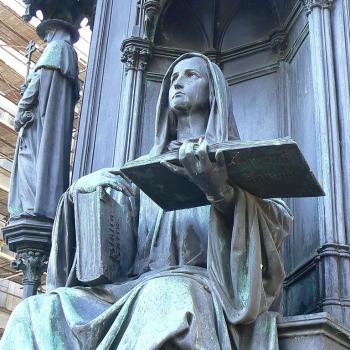Lectionary Reflections
Lamentations 1:1-6
October 6, 2013
It may be well not to read the small book of Lamentations if you are looking for a word of biblical uplift. It is a genuine downer, a big time paean to shock, horror, and disquieting despair. Little wonder that the book has long been connected to Jeremiah, the prophet whom the book follows in the biblical canon. It surely could have been composed by that dark prophet who witnessed the end of Judah, the destruction of the temple and the palace of the king at the hands of Nebuchadnezzar's thugs, and the exile of the final Davidic king, Zedekiah, after the murder of his heirs before his very eyes. Though Jeremiah was dragged off to Egypt by his few followers against his will soon after Jerusalem's end, the grim portrait of a blasted and starving city found in these five chapters ring with a dejection the prophet must have felt after forty years of a ministry that announced doom and destruction, both of which came all too horribly true.
Still, there is no actual evidence that Jeremiah wrote the book; perhaps one of his own disciples was the author. We will never know. But the lament's piercing words resound still in our ears as a loud witness to the terrors of destruction that Jerusalem and its inhabitants faced when the Babylonians smashed the city into piles of rubble and carted the leaders off into ignominious exile to the world's greatest city, fabled Babylon.
The context appears clear enough. The year is 587 B.C.E. and the months succeeding that date. After a lengthy siege, Nebuchadnezzar's armies broke into Jerusalem, slaughtering the hungry inhabitants, raping the women, seizing the power brokers—priests, king and court, scribes, accountants—and herding them west toward Babylon. The great majority of the city dwellers were left to fend for themselves. The economy quickly collapsed, food sources disappeared, water sources were fouled, the daily rhythms of life ceased. People wandered the streets dazed, confused, desperate for a bit of bread, a cup of water. The city became unsafe, as any semblance of order was replaced by chaos. All of these realities are suggested by the poems that make up the chapters of Lamentations. A reading of these chapters is a hard and painful task as image after image of dread and panic swims into our minds.
So what is a preacher to do with this? Of course, these images are not unfamiliar to us in the 21st century; our TV screens fill nearly every day with similar scenes, sometimes far away in lands we have not visited, in places of war and exile and terror, and sometimes in places we know too well, in our very own cities, the parts of which we have not visited and have forgotten in our mad rush toward success and excess. One could surely preach a potent word about our pleasant ignorance of the ways of life of too many of our planetary brothers and sisters. One could do so.
But something else pricks me today. I am struck, as I read the five chapters of this very stark series of poems, at the struggle the poets feel in the face of the realities of pain and death between their resolute clinging to the hope of God and the vast despair they feel whenever they open their eyes again as witness to the monstrousness that threatens to consume them and their faith forever. Just how can one maintain faith in the hope and promise of God when confronted with the dismay, the genuine intimidation of what we humans can and have done to one another? I have many Jewish friends, and I am reminded again and again of their disparate reactions to the horrors of the Shoah, the "destruction" of European Jewry in the death camps of Hitler. I would catalogue those reactions into three, although I am certain that this categorization grossly oversimplifies the complexity of their struggle.
First, there are those who mightily cling to the faith of the ancestors; despite what their eyes see—skeletal bodies, piles of ashes and shoes and eyeglasses—they claim with Lamentations 3:22, "The steadfast love of YHWH never ceases; God's mercies never come to an end; they are new every morning; vast (great) is your faithfulness!" Such a claim is shouted in the face of all hideous realities. Indeed, the Christian hymn, "Great is Thy Faithfulness" has become an anthem especially for those who find themselves facing such horrors as they simply cannot face alone and refuse to give into the nihilism and faithlessness that could destroy their hope and their lives.
Second, there are those who are not so sure about all that supposed certainty of YHWH's love and faithfulness. Can one maintain a traditional faith when six million die for the absurd reason only that they are Jews, the mad result of a mad man whose prejudice against Judaism and its followers was hatched in the steamy pits of a weak and twisted brain? Can traditional faith survive such an unspeakable thing? These friends continue to worship, continue to pray, but they remain hardly traditional.





